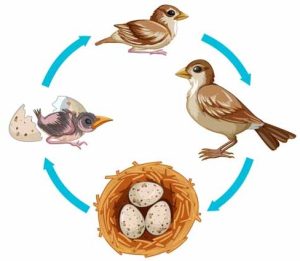Notes For All Chapters – English Poorvi Class 6
What a Bird Thought – Part 2
Main Theme:
- The poem is about the journey of a young bird as it grows up and discovers the world. Initially, the bird has a limited view of the world, but as it matures, its understanding expands.
Summary of Each Stanza:
- Stanza 1: The bird lives in a small, round house (an eggshell). The bird thinks the whole world is the small, blue, and round shell.
- Stanza 2: The bird moves to a straw nest, nestled by its mother. It thinks the world is made of straw, and it feels safe and warm.
- Stanza 3: As the bird grows and leaves the nest, it sees the world is much larger than the nest and is made of leaves. It realizes that its earlier view of the world was limited.
- Stanza 4: The bird becomes an adult and flies beyond the tree. It admits that it no longer knows how the world is made and realizes that neither do the other birds (its neighbors).
Important Ideas:
- Limited Perspective: The bird initially believes that its small home is the entire world.
- Growing Understanding: As the bird grows, it learns that the world is much larger and more complex than it first thought.
- Maturity: The bird’s journey represents how our understanding of the world evolves as we grow older and experience more.
Key Vocabulary:
- Nestled: To be comfortably settled in a place.
- Blind: The bird was unaware or had a limited understanding.
- Labours: Work or tasks, which in this context refers to the bird becoming an adult and taking on responsibilities.
Moral of the Poem:
- The poem teaches that our understanding of the world is shaped by our experiences, and as we grow and explore more, we realize there is much we don’t know. It encourages curiosity and openness to learning.
Symbolism:
- Eggshell: Represents the limited knowledge of the bird when it is young.
- Straw Nest: Represents a safe and comfortable environment where the bird grows, nurtured by its mother.
- Leaves and Trees: Symbolize the expanding world and the bird’s growing understanding as it ventures beyond its nest.
Notes in Hindi
मुख्य विषय:
- यह कविता एक युवा पक्षी की यात्रा के बारे में है, जो बड़े होते हुए दुनिया को समझता है। शुरुआत में, पक्षी की दुनिया की समझ सीमित होती है, लेकिन जैसे-जैसे वह बड़ा होता है, उसकी समझ बढ़ती जाती है।
प्रत्येक छंद का सारांश:
- पहला छंद: पक्षी एक छोटे, गोल घर (अंडे के छिलके) में रहता है। उसे लगता है कि उसकी पूरी दुनिया यही छोटा, नीला, और गोल घर है।
- दूसरा छंद: पक्षी अपने घोंसले में अपनी माँ के साथ रहता है। उसे लगता है कि दुनिया तिनकों से बनी है, और वह घोंसले में सुरक्षित और आरामदायक महसूस करता है।
- तीसरा छंद: जैसे ही पक्षी बड़ा होता है और घोंसला छोड़ता है, उसे पता चलता है कि दुनिया घोंसले से कहीं बड़ी है और पत्तियों से बनी है। उसे यह एहसास होता है कि उसकी पहले की सोच बहुत सीमित थी।
- चौथा छंद: पक्षी एक वयस्क बन जाता है और पेड़ों के परे उड़ता है। अब वह स्वीकार करता है कि उसे नहीं पता कि दुनिया किस चीज़ से बनी है, और उसे यह भी लगता है कि उसके पड़ोसी पक्षी भी नहीं जानते।
मुख्य विचार:
- सीमित दृष्टिकोण: शुरुआत में पक्षी को लगता है कि उसकी छोटी सी दुनिया ही पूरी दुनिया है।
- समझ का विकास: जैसे-जैसे पक्षी बड़ा होता है, वह सीखता है कि दुनिया बहुत बड़ी और जटिल है।
- परिपक्वता: पक्षी की यात्रा यह दर्शाती है कि जैसे-जैसे हम बड़े होते हैं, हमारी दुनिया की समझ भी बढ़ती है।
मुख्य शब्दावली:
- घोंसले में बसेरा: आराम से किसी स्थान पर बसना।
- अंधा: पक्षी की सीमित समझ या जानकारी को दर्शाता है।
- कष्ट: यहाँ यह शब्द पक्षी के बड़े होने और जिम्मेदारियों का प्रतीक है।
कविता की शिक्षा:
- यह कविता सिखाती है कि हमारी दुनिया की समझ हमारे अनुभवों से बनती है, और जैसे-जैसे हम बढ़ते हैं और नए अनुभव करते हैं, हमें एहसास होता है कि दुनिया में जानने के लिए बहुत कुछ है। यह जिज्ञासा और सीखने के प्रति खुलेपन को प्रोत्साहित करती है।
प्रतीकवाद:
- अंडे का छिलका: यह पक्षी की कम उम्र में उसकी सीमित जानकारी का प्रतीक है।
- तिनकों का घोंसला: सुरक्षित और आरामदायक वातावरण का प्रतीक, जहाँ पक्षी अपनी माँ की देखभाल में बड़ा होता है।
- पत्तियाँ और पेड़: बढ़ती दुनिया और पक्षी की समझ के विस्तार का प्रतीक।


Leave a Reply